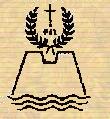|
THE MEANING OF MONASTIC
LIFE
Monastic life is a school to cultivate
STILLNESS and train oneself for contemplation. The monk stands
unimpeded in the presence of God without any anxiety holding him back; he
spends his life with God.
The major concern of the desert as a school
is our thoughts and feelings: "We must take the greatest care
over our feelings and our thoughts in the hard and prolonged work of
renouncing inner desires as we stand before God to pray." In the
desert, the Christian realizes that renouncing not only possessions but also
the desire for them is central; that selfishness is like a serpent coiled
around the heart creating illusions of empty cheerfulness and vain sadness.
The work in the desert consists of prayer to God and the stripping of this
illusory self so that the true image of God within us may be
revealed.
Asceticism is not the practice of long
fasts, vigils, silence, etc. but the act of Repentance, the metanoia, which
consists of turning away from the cultivators of the ego TOWARD the
eradication of the self-will. The long fasts and vigils are meant to
lead to the interior act of repentance. So the desert-dwellers were
known primarily for their ". . .fervent love and great
discipline." So the CELL of the monk was the furnace in which the
monk was purified. . .and found God.
The monks, however, were not the main
actors in the desert; it was the everlasting faithfulness of God, i.e. that
God fulfills all His promises if you live the fullness of the Gospel
The monks were not made gloomy by their asceticism; precisely, because of
their asceticism, they were more alive and approachable. Even their
physical appearances were not shabby but reflected the vibrant new life
within them. So John had a "a bright and smiling
face". Bes was "gentle and serene". Anmmonius
welcomed his guests with a feast. Didymus had a charming
countenance. Apollo was cheerful. Happiness was not an option. .
.it was a monastic obligation.
The desert was a place where monks
lived, separated in their cells but united in unaffected love.
They practiced the greatest virtue of the common life--the refusal to
pass judgment on others. Even Abbots refused to see their inferior's
faults with the hope the inferiors would see them themselves. In the
desert, the layman goes in pursuit of the " . . .only one thing
necessary" . . .paradise.
Historia Monachorum
(05-09-05)
|

